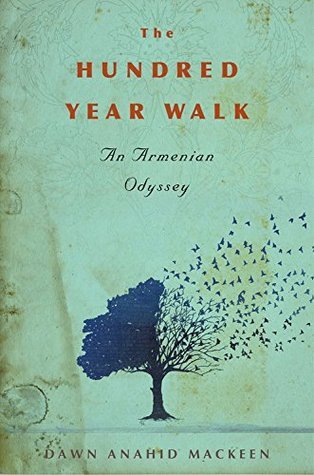I made the point that this book gives a different angle on the genocide that other books don't. Dawn's grandfather's family was allowed to bring supplies along with them. They were relocated to another location and allowed to stay there for a few months, then relocated again. They weren't attacked and robbed to the degree that other Armenian refugees were. Azad said that it seemed that Armenians from the western end of Anatolia were treated better than those from the eastern end.
The question arose as to whether those people who survived the genocide suffered from PTSD. The consensus opinion was that a large number of them probably did.
After comments had been made about conditions in the Armenian refugee camps, Azad compared the condition in the camp in which he grew up in Aleppo in the 1950s. It still survived even after all those years, and was still strictly an Armenian area, surrounded by Arabs who sometimes were quite hostile.
Azad commented that he didn't like the way that the author interleaved the grandfather's memoir with the granddaughter's recreation of the trail that he took. He would have preferred to have read just the memoir. Others of us disagreed with that and thought that the interleaved story was better.
We talked about how the grandfather's journals told the story of his forced march across the Ottoman Empire and talked about things that he never mentioned to his children. Azad equated that to his own family where he could remember times when his father started to say something about his experiences in the genocide and his mother would hush him up, saying that it was too terrible to talk about.
Tashina thought that the book was well written and well crafted. She liked the mixing of the granddaughter's experiences with those of the grandfather.
Al thought that the way the story was told made it seem more like a fiction book rather than non-fiction.
We discussed how the Armenian diaspora started even before World War I.
Azad talked about how the city/region of Aintab resisted the Turkish attempts to relocate the Armenians there, and so survived for awhile. Those people had to relocate three different times.
Peter thought the book was different than the other genocide books that he has read and that he would strongly recommend it to other people.
Al asked about the Turkish government view that the Armenians were aligned with the Russians against the Ottoman Empire. We talked about how there was some basis for that, but that that was the only reason that some groups, like the people in Van, survived.
I'll cut the report here. We left the question of holding a June meeting open. If anyone has a book to recommend for the month of June and a meeting place to suggest, let us all know. Otherwise, I'll see you in September.
Leroy
ACOM Book Club for May 2022
 The ACOM Book Club met at Mim's on Thursday, May 19, 2022. Attendees were Azad, Al, Peter, Tashina and me. The book under discussion this month was "The Hundred-Year Walk: An Armenian Odyssey" by Dawn Anahid MacKeen.
The ACOM Book Club met at Mim's on Thursday, May 19, 2022. Attendees were Azad, Al, Peter, Tashina and me. The book under discussion this month was "The Hundred-Year Walk: An Armenian Odyssey" by Dawn Anahid MacKeen.
The book is described in brief as "The inspiring story of a young Armenian’s harrowing escape from genocide and of his granddaughter’s quest to retrace his steps."
The first question that was raised was by Al. He wondered exactly what Der Zor was and what made it so deadly for the Armenians who were sent there. Several of us gave answers: it was a desert area with no water or food, the Armenians were sent there and left with no shelter or means of support, the Turkish guards prevented other people from giving them any food or water or medical help. Several hundred thousand Armenians died at Der Zor.